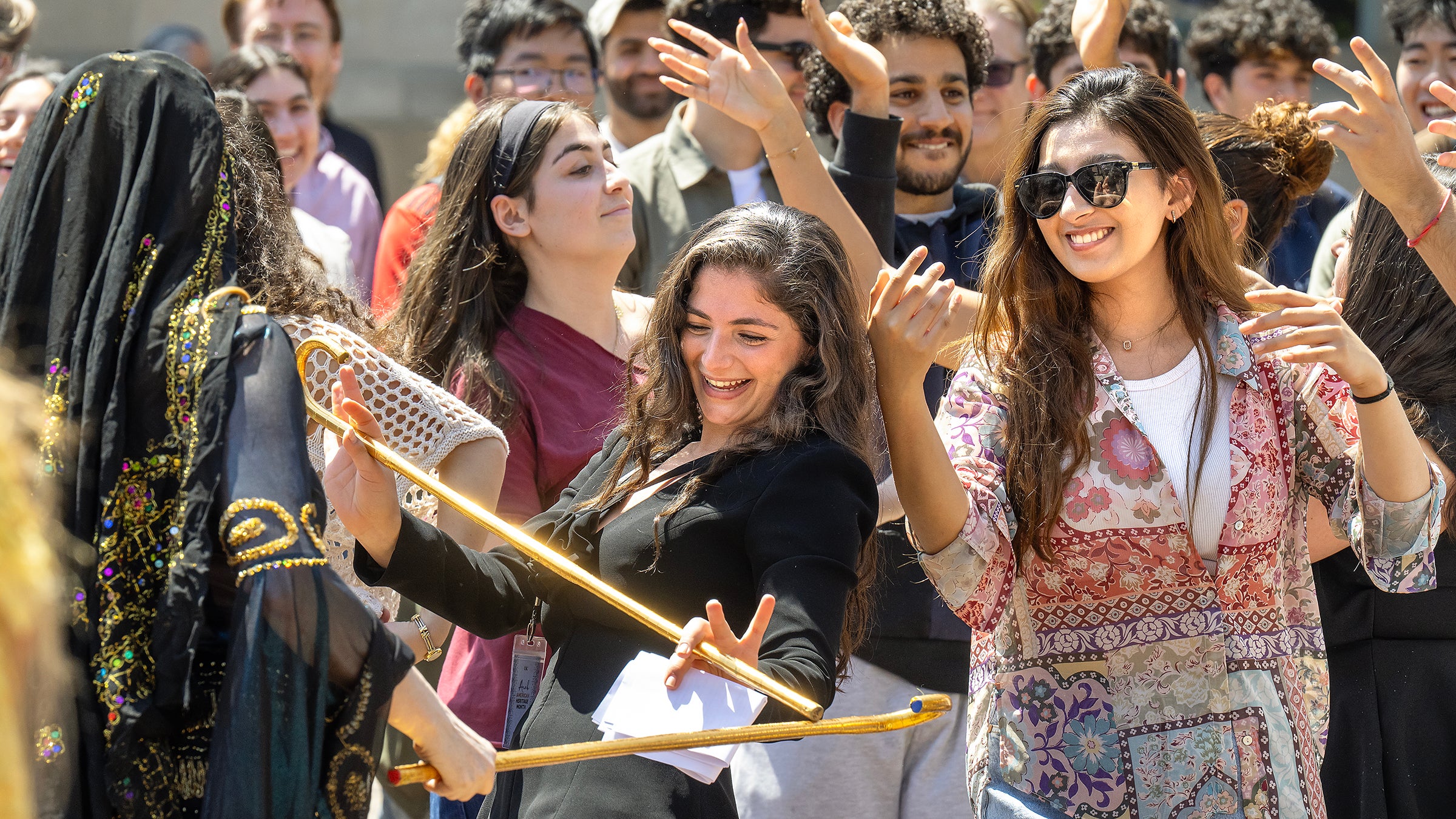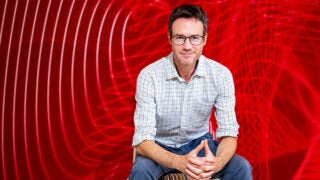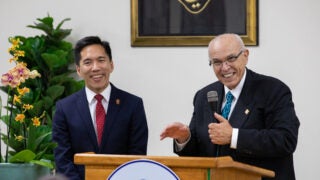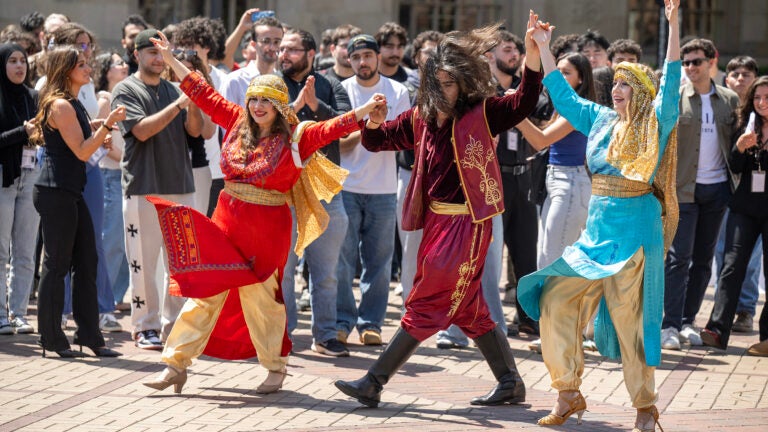
Dabke dancers perform during the Arab American Heritage Month kickoff event. (USC Photo/Gus Ruelas)
Arab American Heritage Month kickoff celebrates resilience and solidarity
More than 400 Trojans enjoyed traditional Arabic food, dance and henna art during the event in Hahn Plaza on the University Park Campus.
At the Arab American Heritage Month kickoff celebration in Hahn Plaza on Monday afternoon, Zeina Kaibni, a junior at the USC Marshall School of Business, read a personal poem in Arabic whose title translates to “Roots Grow, Branches Reach.” This was also the theme of the event, which explored how the Arab American experience is deeply rooted in rich cultural heritage.
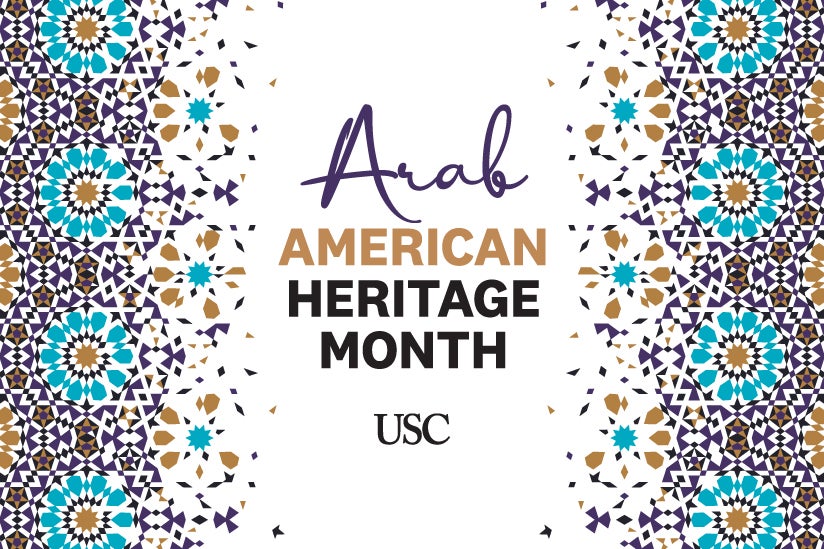
Speaker Nour Myra Geha — a senior at the USC Dornsife College of Letters, Arts and Sciences and the event’s emcee — noted the resilience of Middle Eastern and North African (MENA) people in the face of challenges across generations, from war to exile.
“They still found ways to sing, to build and to thrive,” said Geha, co-founder and co-executive director of USC’s Middle Eastern North African Student Assembly (MENASA), which led the event.
Embracing that vibrant spirit, the more than 400 Trojans who attended the upbeat noontime event enjoyed an interactive performance of dabke, a Middle Eastern circle and line dance, by drummers and dancers in colorful costumes. Attendees also sampled sweet and savory Arabic pastries and cardamom-infused coffee and had the backs of their hands decorated with intricate henna designs by Keya Agarwal, a senior at USC Marshall.
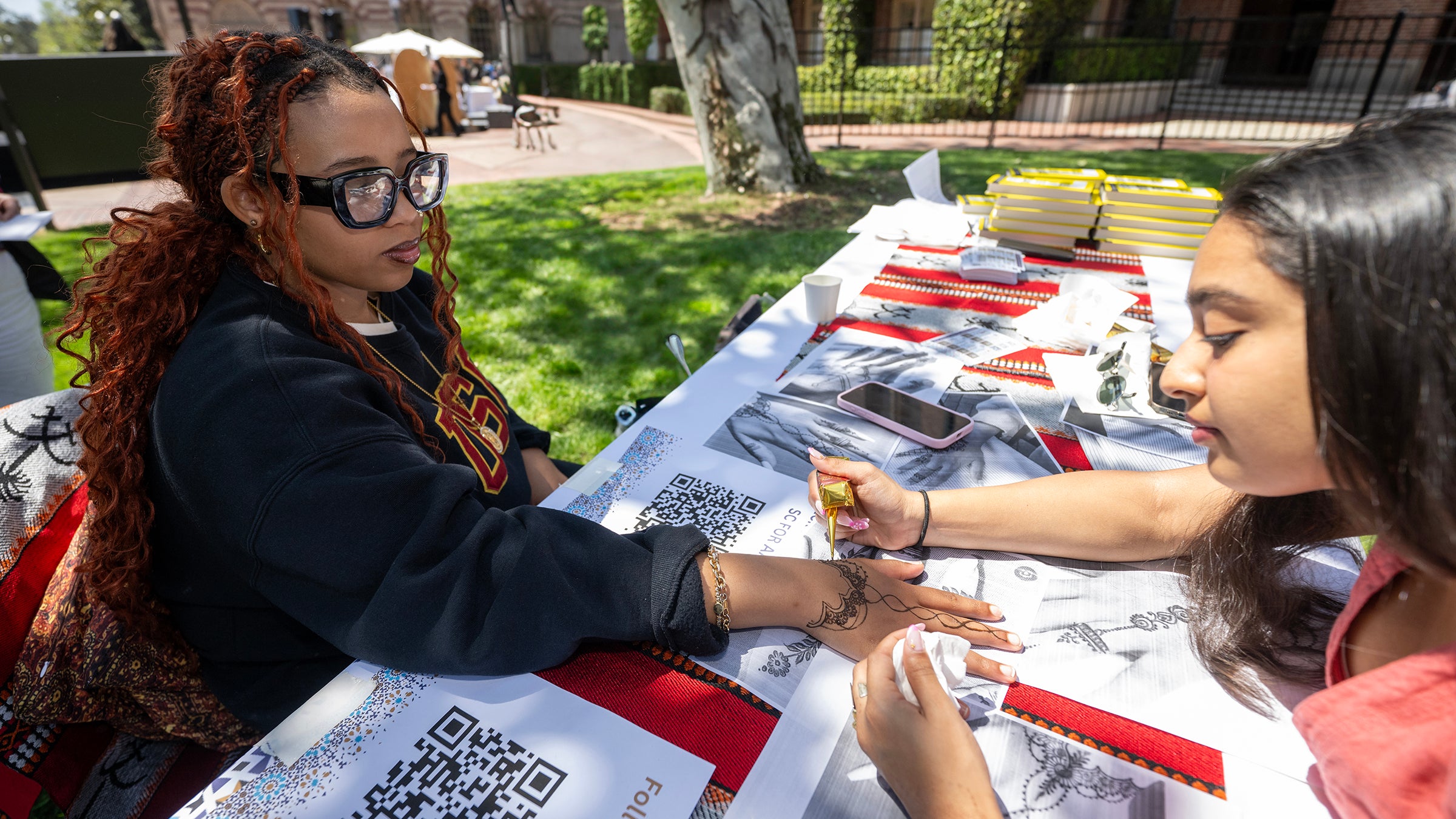
Yehya Hamzeh, a master’s student at the USC Price School of Public Policy who attended the kickoff for the second year in a row, hadn’t intended to take part in the dancing. “I usually just stay back [on the sidelines] and clap to the music,” he said. But he was swept up with fellow MENASA members into the circle of dancers at the center of the plaza.
While Hamzeh appreciated joining hands with those who share a similar heritage, he characterized the event as welcoming to Trojans from all backgrounds: “We’re saying, ‘Everyone come enjoy our culture, enjoy our food — and it’ll be a great time.’”
Monday’s kickoff is the first in a series of events that will also include a movie night, dabke and falafel night, and gala dinner.
A new global identity
The event’s keynote speaker was Lena Khouri, a Los Angeles-based entrepreneur who founded Between East, an entertainment and media company that celebrates MENA art, creativity and culture.
Khouri began her career at Creative Artists Agency, the global talent firm. She was struck by the dearth of MENA people in the entertainment industry and concerned about negative portrayals of those groups in the media. “I started Between East to use the creative arts to reveal a new global identity about our people,” said Khouri, whose family is Palestinian and Jordanian.
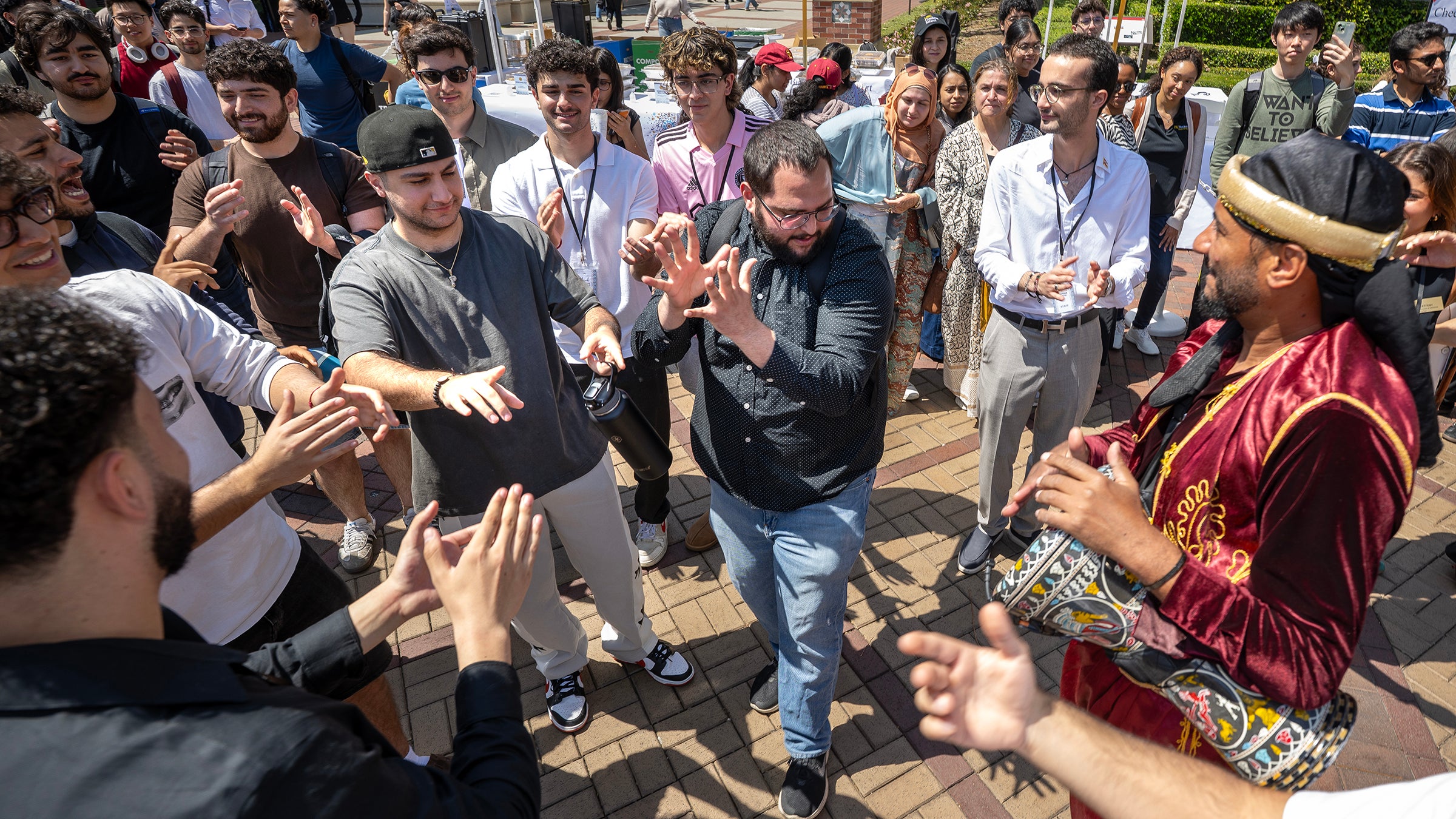
She encouraged attendees to use their creativity to showcase MENA culture in ways that shift perceptions. The brands they create or the films and music videos they produce can “show how cool our culture is … how beautiful our food is and our tradition is, and who we are and how diverse we are,” Khouri said.
The entrepreneur likened her journey founding Between East to the one Geha and other students took to start MENASA. In fall 2022, the group was established after 2023 graduate Anthony Khoory, Geha and other persistent Trojans persuaded the Undergraduate Student Government to admit their club as its own assembly, complete with the funding, dedicated staff and other resources that come with that status.
Khouri noted that historically, the MENA community hasn’t had “a seat at the table” within American culture. “That scarcity mindset from our past generation has prevented us from always necessarily working together,” Khouri said. “This new generation presents an opportunity to create something from scratch [like what MENASA has] done here, to grow it, defy all odds and fight the fight.”
Roots on campus
Speaker Katia Atiyah, a junior at USC Marshall, grew up in Washington, D.C., but her family is Lebanese and Jordanian. She spoke of her experiences visiting family halfway across the world and weaving their traditions into her American girlhood.
“I brought my own spices to school because cafeteria food just didn’t feel like home,” said Atiyah, who has served on the MENASA executive board for three years. “I longed to be part of a community where I didn’t have to explain myself, where I could simply exist and be understood.”
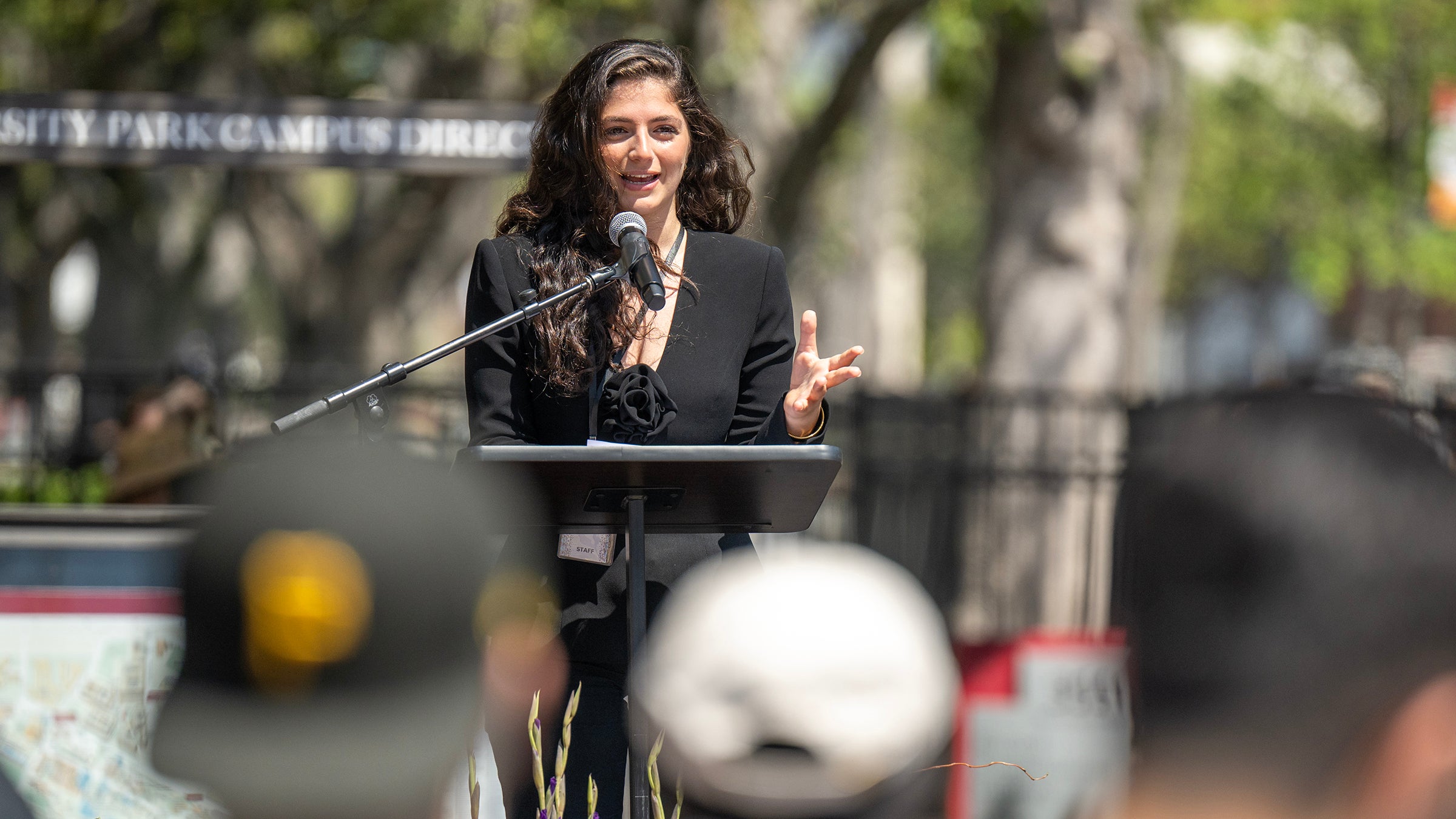
Atiyah said she found that sense of belonging in MENASA, a group she has helped grow from its modest roots into a vibrant organization with many expanding “branches.” The group held the first Arab American event on the University Park Campus in 2022 with a budget of just $100 and baked the baklava for the event themselves. Today, the group has more than 1,500 active members and has organized a range of activities including an art exhibition, small-business marketplace and community dinners.
“MENASA began as a whisper,” said Geha, who grew up in Lebanon. “It became a voice and then a movement.”
With the group’s roots firmly planted, “We reach to lift up every next generation, especially the freshmen who are now here and realizing that they have a community on campus,” said Geha, who graduates this May — the last founding member of MENASA to do so.
Dima Al-Qaysi, a freshman at the USC Viterbi School of Engineering attending a MENASA event for the first time, was inspired by Geha’s message of passing the torch. Excited about the dance performance and the Arabic coffee that connected her back to her Iraqi heritage, she said, “I want to get involved in the community more.”
